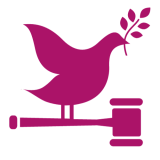From Process to Purpose
The University of Toronto Scarborough's partnership & engagement framework provides an intentionally crafted compass to guide the bridging of relationships between partners––both internally and externally.
The framework is an innovative, community-informed, and relationship-driven model that fits the collective culture of the campus and our dedication to intentional inclusion, reciprocity, joint partnership with students, staff, faculty and community, and relational accountability. It is rooted in the campus' and community's collective work and anti-colonial practices.
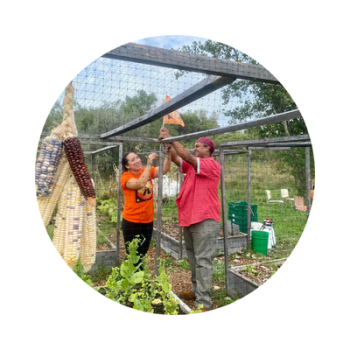
Our Collective Roots
Over the past decade, U of T Scarborough has shifted our institutional culture so that faculty, staff, and students see themselves as civic actors within larger local and global communities.
Building on foundational work with the community in Kingston Galloway-Orton (KGO), the University has co-developed, with community partners, U of T Scarborough staff, faculty, students, and alumni—specifically those involved in the Strategic Plan process (SD 4.1 Working Group)—a partnership engagement framework that provides a model for impactful partnership between the campus and community and honours the knowledge systems of Indigenous peoples and people of African descent.
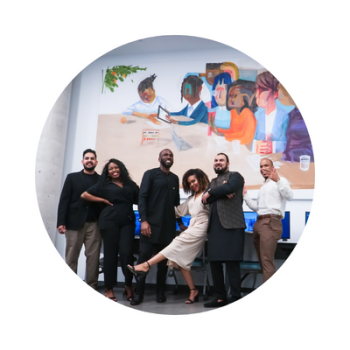
Infinite Possibilities Together
Intentional process is the vehicle that transports us into the future. Meant to be a model of reflection—both for internal stakeholders and external partners—the framework comprises a visual map and resource guide to empower our community in building sustainable and reciprocal relationships, and ultimately, a future of infinite possibilities together.
Partnership & Engagement Framework and Resource Guide: Collective Work of the University of Toronto Colleagues. External Communities and Strategic Partners © 2023 by Kimberley N. Tull, Melanie Blackman, University of Toronto Scarborough Community Partnerships & Engagement Department, and External and Internal Partners is licensed under C BY-NC-ND 4.0.
The Partnership & Engagement Framework
Interact with the partnership & engagement framework below
The stages
Values
The partnership engagement framework begins at Stage 1 - Values, where it asks partners to share guiding beliefs and principles that inform the partnership’s decisions and activities.
Understanding
Stage 2 - Understanding is about establishing the purpose of coming together and what the relationship is hoping to accomplish based on each other’s priorities.
Self Determination
Stage 3 - Self-Determination revolves around partners choosing and setting their own goals, making decisions, self-advocating, and then working together to reach those goals.
Coordination
Stage 5 - Coordination focuses on organizational independence. It’s where self-interests and resources are defined.
Collaboration
Stage 6 - Collaboration is when partners work together on a specific project to reach a common goal and innovative ideas are presented to meet a common priority.
Collective Interest
Stage 7 - Collective Action is a multi-sector coalition towards a common goal with an aim of holistically improving conditions for a group of people, neighbourhood, or region.
Revisit, Rethink & Evolve
In Stage 8 - Revisit, rethink, and evolve, decisions and actions are subject to regular oversight and evaluation of the agreed to values, while principles and objectives are met and benefit the external committee as intended.
How to Move Through the Framework
Entailing three fundamental stages––building a foundation, engagement, and revisit, rethink and evolve––the framework pulls from series four of the University's Strategic Plan to exemplify the fluidity and interconnectedness of meaningful partnerships.
Further broken down into eight steps––values, understanding, self-determination, shared interests, coordination, collaboration, collective action, and revisit, rethink and evolve––partners are able to map themselves along any point in the map, and move forward, backwards, or participate in multiple stages at once.
1. Establishing a Foundation
The first four stages in the partnership & engagement framework, which are depicted in white circles, are foundational components.
Before any partnership can progress, it is essential to have an understanding of values, understanding, self-determination, and shared interests to guide the work and support a mutually rewarding partnership. All partnerships regardless of intent or outcome are to be grounded in these first four stages.
2. Mapping Out Engagement
The next three stages, which are depicted in blue circles, are types of engagement.
These entail coordination, collaboration, and collective action. Work in these stages revolves around alignment of strategic directions, working together on specific project, and scaling efforts towards the betterment of a region. Partners could be engaged in one, two, or all of three of these stages simultaneously.
3. Revisit, Rethink & Evolve
Revisit, rethink & evolve, depicted in a light blue circle, emphasizes the importance of pausing to reflect and look at the growth of principles and impact.
It entails creating intentional space for reflection, honest conversation, adjustments, evaluation, and accountability. You may find yourself and your partner(s) revisiting this stage multiple times throughout the partnership. This stage doesn’t just happen at the end, but throughout the entire process.
Download a printable copy of the partnership & engagement framework
The Stages in Action
Infinite Possibilities is a multiform video series that animates each stage in the partnership & engagement framework. It showcases the impact of the community and campus' collective work, explores dynamic community-University partnerships, and highlights real-life examples of purposeful connections that speak to the power of building transformative community impact together.
By expanding opportunities for inspirational knowledge-sharing, we can honour each other's unique histories while reimagining our collective futures.
Over the next while, we will be releasing new videos from the series. Please continue to check in for the latest videos.
Stage 1: Values | Stage 2: Understanding | Stage 2: Understanding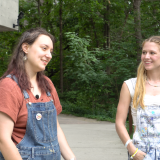 |
Stage 3: Self-Determination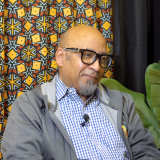 | Stage 3: Self-Determination | Stage 4: Shared Interests
|
Stage 5: Coordination | Stage 5: Coordination | Stage 6: Collaboration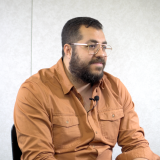
|
Stage 7: Collective Action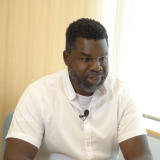 | Stage 8: Revisit, Rethink & Evolve | Stage 8: Revisit, Rethink & Evolve |
Testimonials
This is a model that helps organize the work that many of us are already doing––that paints the process. It helps us have a common understanding of the language and the values of partnerships. It takes the processes and fragments and creates a flow; it creates uniformity.
- Andrew Arifuzzaman,
Chief Administrative Officer, Office of Business, Operations and Strategic Affairs,
U of T Scarborough
I love how [the framework] flows and allows you to opt in and opt out––it helps you understand why you're doing what you're doing and who you're accountable to.
- Howard Moriah, Executive Director, BGC Durham
I feel like this can be very valuable for any type of relationship-building, and we can do it intuitively with partners internally and externally.
- Elsa Kiosses, Health Promotion Nurse, U of T Scarborough
The framework is beautiful and represents the different stages of partnerships to help tell our combined story.
- Josh Berman, Executive Director, Malvern Family Resource Centre
You can see when someone creates something and it’s intentionally done...you can recognize when work is done with Ode' nid gh, which means your heart, and I think people would recognize that.
- Kelly Crawford, Assistant Director, Indigenous Initiatives, U of T Scarborough
The work––thinking, design, spirit––of this framework is brilliant.
- Marc Proudfoot, Equity, Diversity and Inclusion Coordinator, U of T Scarborough
Flashcards to Walk Through the Framework
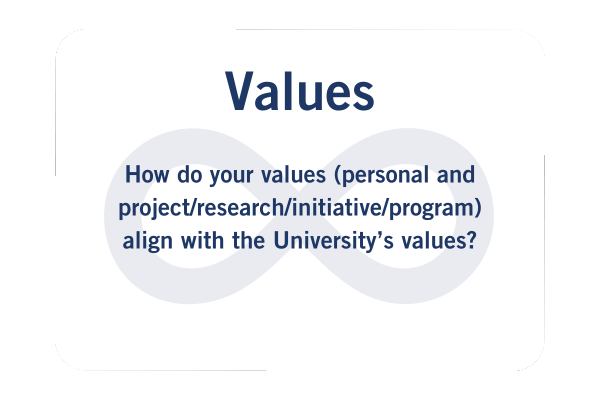 | 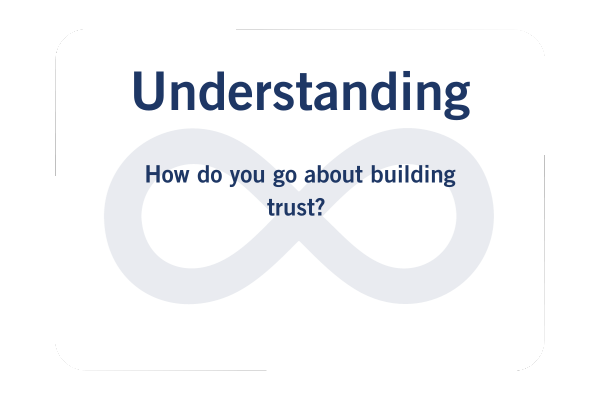 |
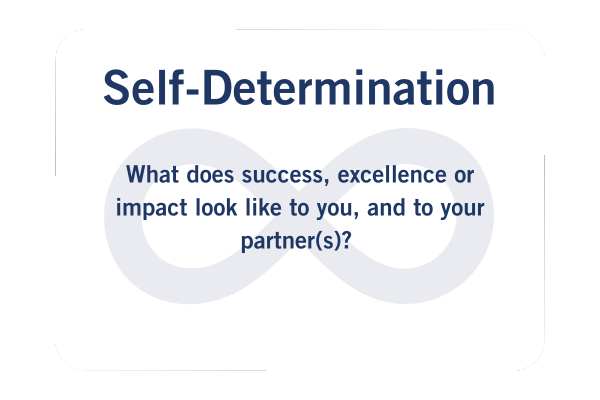 | 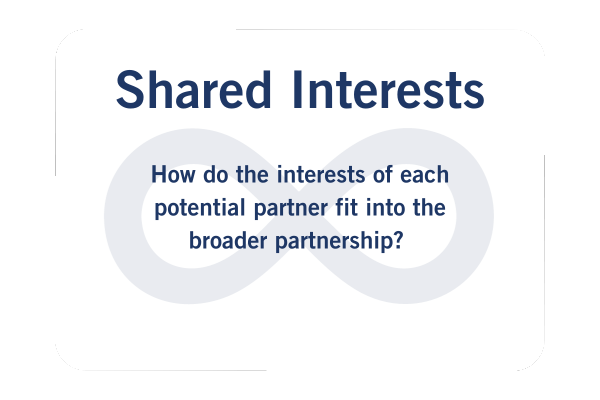 |
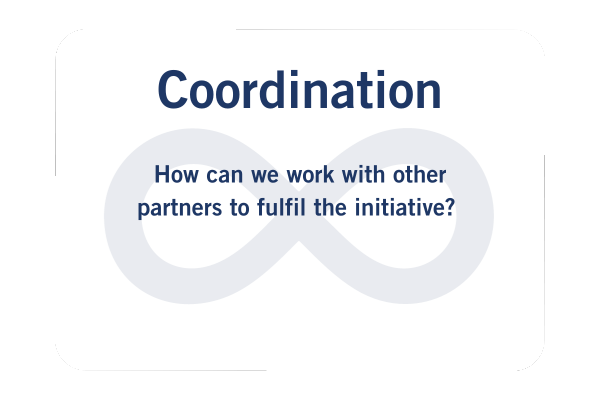 | 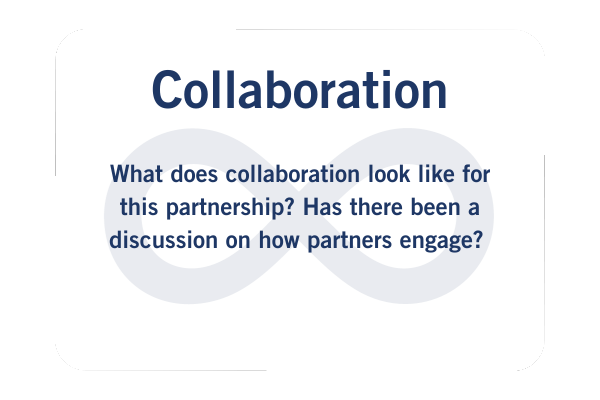 |
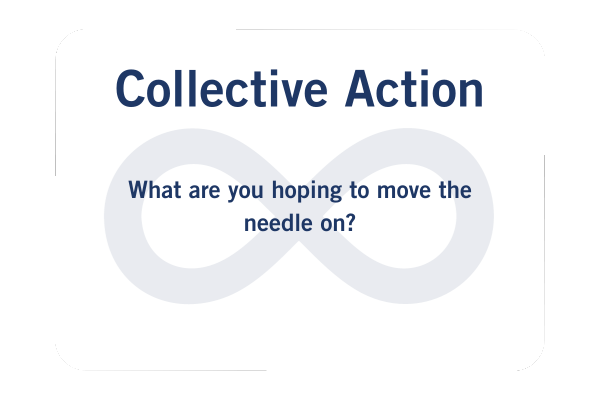 | 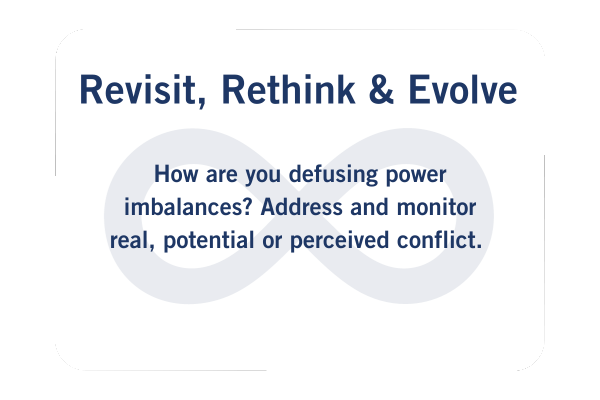 |
Our Partnership Principles
The SD 4.1 Working Group has collectively developed the following partnership principles:
Culture and Values
Shared values, understanding of the purpose and framework, and approach of partners and acceptance of differences (e.g. ways of working, philosophies etc.) are all key components of a successful partnership. Having respect for the contributions of all partners, combined with an acknowledgement of status barriers, will aid in addressing power dynamics and lead to the active involvement and role and responsibility clarity of individual members regarding the division of labour, funding supports, accountability measures, expectations of each other and sustainability of the partnership.
Transparency and Accountability
An emphasis of establishing and valuing a process based on a shared common vision and purpose that builds trust and openness and recognizes the value and contribution of all partners also needs to exist. Additionally, shared, and transparent decision-making processes—extending the scope of influence over and involvement with other services and activities—will prove essential to your partnership. Shared goals and aims, understood, and accepted as being important by each partner, lead to improved coordination of policies, programs, systems, processes, and service delivery, and better outcomes for all.
Not Overly Predictive
Focus on the process and allow for fluidity of the process/relationship/community to drive the direction of the relationship and pace of the work. This allows space for generative discussions and for the partnership and partners to be reflective and responsive – encouraging constant learning and growth.
Rooted in Historical Context and Relevancy
Taking the time to understand and learn the history of the communities, agencies, organizations, and people with which you partner; understanding their relationship with post-secondary institutions and UTSC’s relationship with them. UTSC staff, faculty and students cannot assume that they are the first and only point of contact for a partner. We support and encourage both internal and external partners to look beyond borders and across disciplines and sectors for partnership opportunities and identify mutual benefit.
Being Present
We are present in communities (however defined), involved at community tables, in discussions and have built or are building relationships with community partners, residents, government, industry, institutions, and agencies. We do not show up only when we need something. UTSC’s internal community has a civic responsibility to engage in conversations when there are no asks on the table. If a partnership is going to succeed, it requires strong feedback loops; effective communication at all levels within the partnership and within partner organizations. Sharing and accessing knowledge, stories, and information, needs to exist.
Not Top Down
Staff, faculty, and students do not parachute in, extract data/resources and then leave; we co-create and engage in community participatory-action based research and community-engaged scholarship and partnerships. It is imperative that we acknowledge power dynamics within relationships in order to collectively sustain healthy partnerships. A healthy partnership promotes an atmosphere of learning. Investing in our collective skills, knowledge, and competence needs to be highly valued within the partnership. This open mindset and spirit of facilitation creates opportunities to shape each other’s work and learning together. In this environment, members can more effectively reflect on both developmental successes and failures.
Invested in People
We have invested in human capacity to help navigate external partnerships and engage in shared leadership among individuals who are recognized and empowered by their own organizations and communities and trusted by partners to build consensus, resolve conflicts, and advance joint priorities.
Social Justice Rooted in Human Rights
Remodel human rights and responsibilities at a community level and on a human scale reassert human expertise in shared humanity. Therefore, reclaiming the power that lies in both rights and responsibilities at local, national and international levels.
Our Partnership Values
The SD 4.1 Working Group has collectively developed the following partnership values:
Anti-Colonial Practices
The dynamic processes, reflexive methods, and interdependent practices of unsettling complex structures, systemic mechanisms, and every day (yet power-laden) routines that reaffirm colonial social relations. Decolonization needs to be “inherently connected to the lands, lives, histories, and futures of the Indigenous peoples of Turtle Island. It must be situated and relational, as well as discursively and materially practiced across-and-within varying spaces, places, times, temporalities, and geographies." [Source]
Anti-Oppressive Practice
Anti-Oppressive practice recognizes that multiple forms of oppression can occur simultaneously within micro-, mezzo-, and macro-levels that uniquely impact marginalized people and communities. It works to eradicate oppression and challenge power structures through collective institutional and societal changes (Sakamoto & Pitner, 2005). [Source]
Reciprocity/Mutual Recognition and support
Universities and colleges are embedded in communities locally, as well as nationally, regionally, and internationally. By recognizing a responsibility to foster mutuality, universities and colleges acknowledge that with reciprocity all things do not need to be equal for acceptance and mutuality to thrive. If equality is evoked as the only standard by which it is deemed acceptable for people to meet across boundaries and create community, then there is little hope. Fortunately, mutuality is a more constructive and positive foundation for the building of ties that allow for differences in status, position, power, and privilege whether determined by race, class, sexuality, religion, or nationality.” (Bell hooks, Belonging: A Culture of Place; Scarborough Charter p. 4). [Source]
Our Values
These are the collective values that consider the discussions, perspectives and experiences of the internal and external community members of the SD 4.1 Working Group.
Humility
When we attempt to appreciate the complexities of the community we live in and how that community shapes us — or prepare to relearn, unlearn, adapt our language, and work style to meet the priorities of diverse collaborators — it is necessary that we examine and mitigate any patriarchy or paternalism that may undermine these goals. It challenges us to change the way we carry out our daily activities as students, scholars, teachers, and staff.
Trust, Transparency and Care
This is about consistent behaviour in all our relationships with others. People judge us on our behaviour not our intentions. The principle here is alignment - in essence, does our organizational structures, policies, and systems engender the trust we want to achieve? There is no more important quality for partnerships than hope. Change starts with individuals, and then it grows as we work together with hope for a better, more fruitful future.
Collaboration and Inclusion
Respect for the community and others is important in this process. Without it, the change that is needed will not be possible. A large part of external partnerships revolves around two major values: group inclusion and collaboration. Focusing on solidarity and being respectful of others is a large part of the process [Source].
It is important to note that these principles can be applied across different levels and functions of partnership arrangements. However, existing, or new partnerships should aim to apply all of these principles, as they ground the partnership development. Following these standards will ensure that partnerships are working effectively and will successfully enable them to achieve their overall goals.
We're Designed to Support You
Other touchpoints within the University
Before engaging with external partners or at the early stages of partnership development, please connect with one or more of the following institutionally situated departments listed below. Your colleagues will assist you in ensuring that you are establishing relationships with external partners in a good way and that they align with our partnership engagement approach.
Partnership & Engagement Framework FAQs
A: Yes, the Community Partnerships & Engagement Office would be happy to support you in this process. Please reach out to them: www.utsc.utoronto.ca/partnerships
A: You will need to establish partnership values; oftentimes personal values are entangled with the partnership values. Be sure to critically interrogate yourself and how that may play out in the partnership. Remember partnership work goes “from the me to the we”
A: It is important for this discussion to take place at the beginning of the partnership process, as it helps align objectives and goals of the partnerships. You should revisit your values throughout your partnership and utilize them to help you make decisions related to partnership goals.
A: If you are uncertain about the people on campus who can support you throughout the partnership development and nurturing process, please contact the Community Partnerships & Engagement department as your first point of contact.
A: This is established during the beginning stages and revisited throughout the term of partnership.
A: Trust building is a process that requires time and should be built into a partnership process. The Community Partnerships & Engagement department can support you with the relationship building process.
A: It is important to ask that question of the partner at the beginning of your relationship. The Community Partnerships & Engagement Office can support you in managing that conversation.
A: Yes there are funding opportunities, including:
Through the Vice Principal Academic & Dean's Office there is the Transformative Teaching & Learning Funds (TTLF) aimed to strengthen collaborative, research-informed curriculum and teaching innovation and communities of practice; enhance our capacity to deliver high quality education both in person and online; advance institutional commitments to inclusive teaching and learning; and facilitate initiatives related to experiential learning and global classrooms.
The Experiential Learning Fund (ELF) offers dedicated resources that support new and developing experiential curricular and co-curricular initiatives that integrate program curricula and align with faculty teaching and research interests. Applications open on January 8th, 2024 and close in early April.
- The Pedagogies for Inclusive Excellence (PIE) fund provides support for the implementation of the recommended actions of the Campus Curriculum Review Working Circle, advancing equity-based, holistic, accessible, anti-racist, and anti-colonial pedagogies and curricular development. Proposals must extend beyond a single department, developing cross-campus partnerships and/or bridging the campus and the broader community. Application opens end of November, with the deadline to apply beginning of March.
- The Office of the Vice-Principal Research & Innovation offers internal funding programs for UTSC faculty across all disciplines. More information on OVPRI funding opportunities can be found here.
A: This should be discussed with all partners involved, and at the beginning of the process.
A: It is important to be transparent with the partner and explicit about funding expectations. Similarly, partners should do the same. There are often times when partners can rethink the “success” and those learnings can be shared back to the funder. For support on how to facilitate those discussions and think through the language, please contact one of the departments in the "Types of Partnerships" section. The Community Partnerships & Engagement department can also support in directing you to the appropriate department.
A: Please refer to the Compensation Guidelines.
